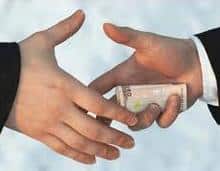To know the meaning of the term dishonesty, it is necessary, first of all, to discover its etymological origin. In this case, we can establish that it is a word that derives from Latin. Exactly it is the result of the sum of the following components:
-The prefix “des-”, which is used to indicate the reversal of the action.
-The noun “honor, honoris”, which can be translated as “decency” or “dignity”.
-The suffix “-stus”, which is used to shape adjectives.
-The suffix “-idad”, which indicates “quality”.
Dishonesty is the condition of one who is dishonest : that is, who lacks honesty (honesty, rectitude). The concept also applies to the dishonest event, action or saying.
 For example: “Society should not reward dishonesty,” “The corruption of the ruling classes encourages dishonesty in the population,” “Your dishonesty caused me a lot of pain.”
For example: “Society should not reward dishonesty,” “The corruption of the ruling classes encourages dishonesty in the population,” “Your dishonesty caused me a lot of pain.”
Whoever acts dishonestly lacks the truth or resorts to deception or scams . Suppose the owner of a business dedicated to selling food notices that he has several expired jars of jam. The correct thing would be for you to discard these products and not sell them: however, you choose to cross out the expiration date so that buyers do not notice the expiration date. The merchant, therefore, proceeds dishonestly.
A mechanic, for his part, is acting dishonestly if he tells a customer that his car has various defects that, in reality, the vehicle does not have. In this way, the specialist maintains that it is essential to change the carburetor and the distribution belt for the car to function correctly, something that is false. This allows the dishonest mechanic to charge a lot of money for work that is unnecessary.
The different studies carried out so far within the field of psychology to address the issue of dishonesty establish that if there are people who are dishonest or who commit acts that are dishonest, it is because from a young age we learn that if we lie we can obtain more benefits than by telling the truth. truth or that if we deny what we have done we can avoid the corresponding punishment.
In the same way, it is considered that, currently, there are day-to-day factors, situations or events that can contribute to promoting dishonesty. Specifically, we are referring to aspects such as conflicts of interest, power, wanting to obtain the greatest possible benefits in different areas of life, competitiveness, consumerism...
It is also considered that it is possible to detect a dishonest person because their verbal language and body language do not match, because they become aggressive, because they move very nervously, because they do not answer directly the questions asked of them. …
Sometimes dishonesty is a crime : the action may constitute a scam, to name one possibility. In other cases, however, it is an ethical offense (such as that committed by a young man who tells his girlfriend that he has to work late and that is why he cannot go out with her, but ends up going out with another girl).
